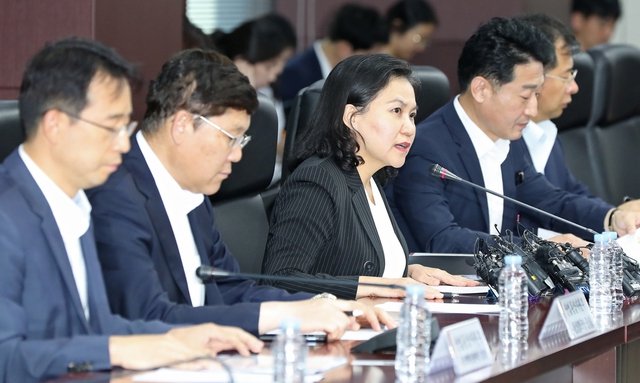 |
|
South Korean Trade Minister Yoo Myung-hee makes remarks during a meeting regarding Japan’s recent export controls at the Korea Trade Insurance Corporation on July 4. (Yonhap News)
|
S. Korea likely to require both diplomatic and economic assets to resolve issue
Japan’s export controls that are designed as retaliation against a South Korean Supreme Court decision awarding damages to victims of forced labor during the Japanese colonial occupation went into effect on July 4, placing South Korea’s foreign policy under the microscope. While the South Korean government is considering the options of filing a complaint against Japan with the World Trade Organization (WTO) and investing in reducing the high-tech sector’s dependence on Japan for parts and materials, it won’t be easy to find an economic solution capable of counteracting Japan’s retaliation, which deliberately targets South Korean industry where it’s most vulnerable. In order to solve this complex equation, South Korea will likely need to mobilize both economic and diplomatic assets. The first suggestion offered by experts is “top-down” diplomacy between South Korea and Japan. Analysts believe that the retaliatory measure was engineered by three people: Japanese Prime Minister Shinzo Abe; Takaya Imai, a former official from the Ministry of Economy, Trade, and Industry and one of Abe’s closest aides as his executive secretary for political affairs; and Hiroshige Seko, who leads the Ministry of Economy, Trade, and Industry. The Japanese Foreign Ministry’s role has been downgraded to such an extent that it wasn’t even aware of the measure in advance. “If the Blue House and Abe’s office don’t engage in top-down diplomacy, this issue won’t be easy to resolve. There needs to be behind-the-scenes dialogue between those two offices, and the channel of dialogue between Blue House National Security Director Chung Eui-yong and National Security Advisor Shotaro Yachi needs to be restored as well,” said Yang Gi-ho, a professor at Sungkonghoe University. US has “abandoned” its responsibility in S. Korea-Japan dispute A second point that South Korea needs to pay attention to is spreading criticism in the international community, deriving from concerns that Japan’s sanctions will harm the global supply network of high-tech electronic products and disrupt the free trade system. In light of the special relationship between South Korea, the US, and Japan in East Asia, South Korean diplomats also need to try getting the US involved. Given these three countries’ close security ties, the US has long played the role of arbitrator in conflict between South Korea and Japan. Under President Donald Trump, who doesn’t value alliance relationships, the US has intervened less aggressively in disputes between its allies, but there are growing concerns even inside the US that the South Korea-Japan dispute could move for the first time from a diplomatic spat to an economic brawl. “Americans have always understood that the escalation of tensions between our two [principal] allies in [N]ortheast Asia is a threat to our own national security interests. This government has abandoned its responsibility,” Daniel Sneider, a lecturer at Stanford University, was quoted as saying in a Bloomberg article on July 4. The US appears to be watching developments closely. On July 2, US Ambassador to Japan William Hagerty expressed his hope that the conflict between South Korea and Japan would be resolved through diplomatic efforts. “The current situation is a multivariable equation that can’t be resolved through South Korea-Japan diplomacy alone: it can only be solved when South Korea, Japan, and the US all engage in diplomacy. All the diplomatic channels need to be activated so that the US can play a role in this conflict as well,” Yang Gi-ho said. Public backlash from within Japan The third diplomatic variable is public opinion inside Japan. Even Japanese experts have asserted that these measures could be in violation of WTO agreements, and the press has continued to print critical editorials, such as one by the Asahi Shimbun titled, “Rescind the retaliation immediately.” Japanese retaliation involves revising the law to limit exports to South Korea by essentially treating it as a security concern, but critics argue that the Japanese government hasn’t bothered to explain why it views South Korea as a security concern. “Because this measure is closely linked to the interests of Japanese companies, tougher criticism inside Japan could force someone as hardline as Abe to back down in search of an escape route. NGOs in South Korea and Japan need to join forces to aggressively raise awareness of the injustice of this measure,” said Song Gi-ho, an attorney on MINBYUN’s International Trade Committee. By Park Min-hee, staff reporter Please direct comments or questions to [english@hani.co.kr]






